
Mediocre sales leaders push blame downstream. It's not them; their underperforming sales reps don't have what it takes. But the reality is that without good sales management, only the most naturally talented salespeople will close deals.
Excellent sales management can help you maximize your talent, fill your pipeline, and boost your bottom line. This article explores what it takes to be a great sales manager and how to set up an effective sales management system in your company.
Table of Contents
- What is sales management?
- Different types of sales management
- What is a sales manager, and what do they do?
- 5 most important sales management skills in 2024
- 4 main sales management styles
- 5 types of common sales management tools
- Impact of the RevOps revolution
- What is a sales management system, and why do you need one?
- What's next?
What is sales management?
Sales management is the process of setting and refining sales objectives, hiring and training your sales team, and creating sales processes. The sales manager leads the sales staff throughout the sales cycle, using revenue forecasts, training, and strategy to help their reps meet and exceed their sales targets.
Here's a quick overview of some essential sales management tasks:
- Setting and working toward sales goals like quarterly sales quotas
- Creating a sales playbook with sales plays to help improve rep performance
- Creating and organizing sales onboarding for new hires
- Adjusting sales training programs to meet the needs of your company
The main building blocks of effective sales management
If you want to break sales management down into sub-disciplines, you could do it in this way:
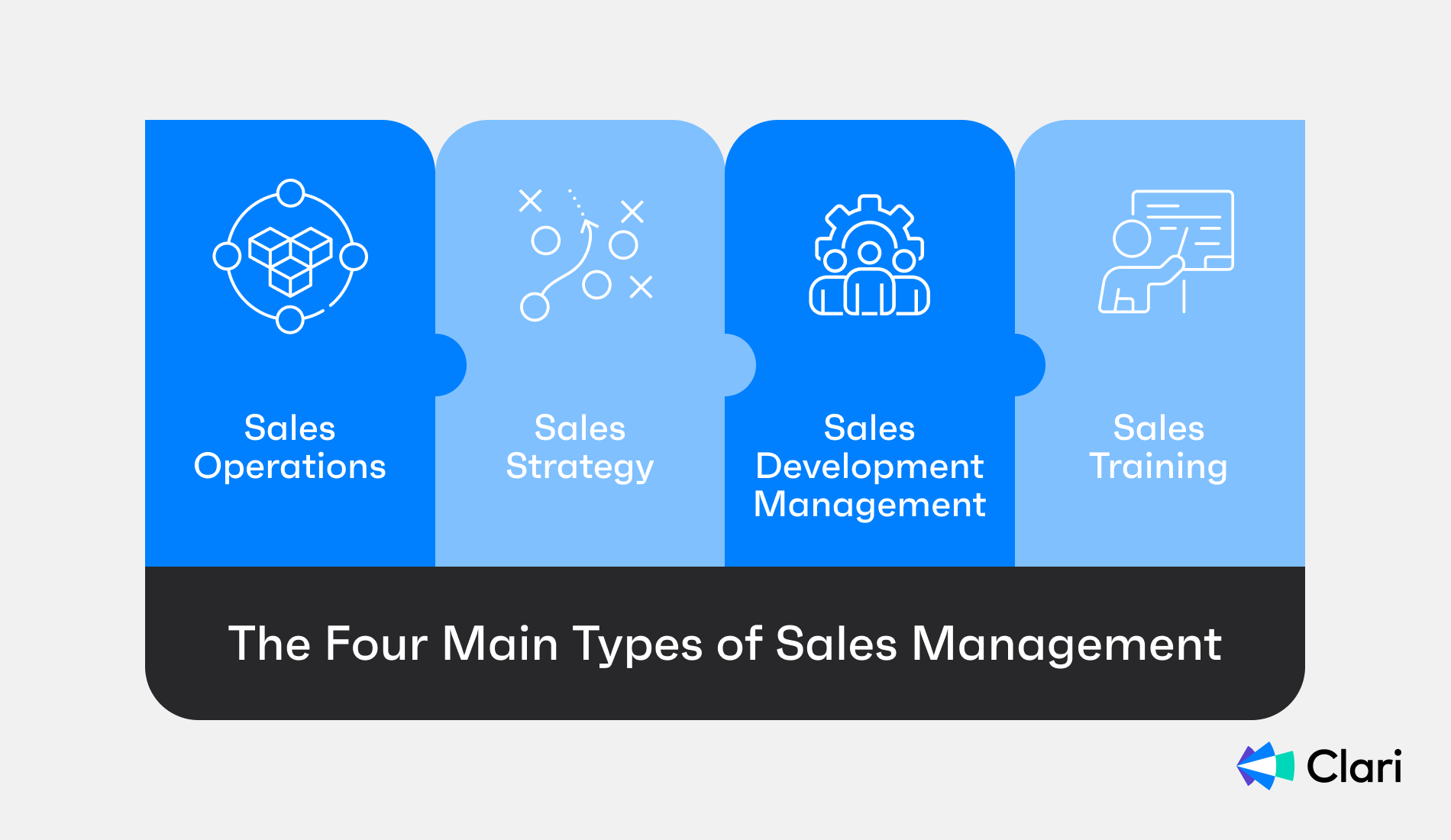
- Sales operations: Managing the day-to-day of the sales team. Are you meeting your quota? What are your reps struggling with and how can you help?
- Sales strategy: Managing the overall strategy of your organization. Where do you fit into the competitive landscape? What is your unique selling proposition (USP)? Who are your ideal customers?
- Sales development management: Managing how your company gets new prospects in the sales pipeline. How is your team of sales development representatives (SDRs) currently prospecting? How can they improve?
- Sales training and enablement: Creating and updating training programs and systems to help your reps perform at their best. Creating systems, sales plans, and tools to help your reps close more deals.
Five main types of sales management
The scope and nature of sales management depend on each company's industry, size, and market. But broadly speaking, there are five different types of sales management:
- B2C sales management: In consumer sales, prospects often walk into a store (or reach out to your team) ready to buy a product. So you need to train them to effectively recommend highly profitable products that meet their needs. Sales managers also need to focus on sales training and onboarding, as turnover tends to be quite high.
- B2B sales management: In business-to-business sales, the sales cycle is usually longer and more complicated. Managers need to train their reps to take a consultative selling approach. Sales development and prospect nurturing are also crucial responsibilities in B2B sales.
- Enterprise sales management: In enterprise sales, sales cycles are even longer and involve a lot more decision-makers. Sales managers need to create a strategy that helps their reps involve the right executives in the process. Forecasting also gets more complex with slower sales pipelines.
- SaaS sales management: Smart subscription-based firms like SaaS or B2B service companies no longer focus on just sales. They combine sales, marketing, customer success, and support into a single unified go-to-market effort.
- Field sales management: In industries like corporate IT, healthcare technology, and insurance, reps actually go out into the field to meet prospects face to face. That means you need to distribute leads effectively by location, not just company type or other factors.
What is a sales manager and what do they do?
In 2024, a sales manager uses insights from sales performance data to help guide their sales team and create processes that help their reps shine.
The level and scope of their involvement depends on the specific position. A good way to understand that scope is to contrast a typical sales manager with a VP of Sales.
Here are some of the typical tasks of those two different sales roles:
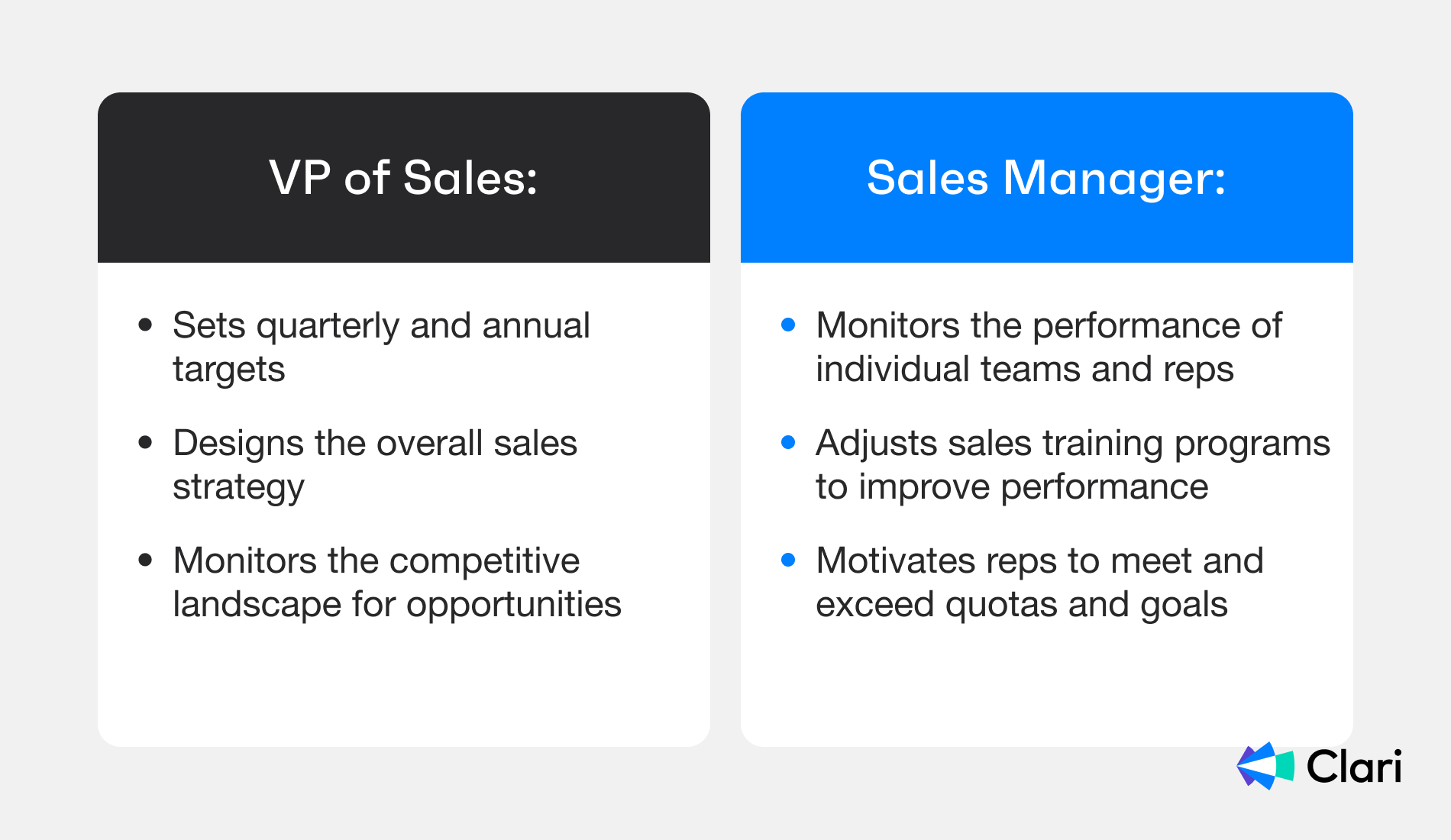
A VP of Sales focuses a lot more on the higher level. They'll explore the competitive landscape. They'll talk to decision-makers in ideal client companies to understand their priorities. They'll base the company's overall sales strategy on this research. Finally, the VP will set quarterly and annual sales targets accordingly.
A VP of Sales is also responsible for the company's corporate sales culture. They need to create a motivating environment for every sales rep and manager.
A sales manager is typically responsible for a smaller sales team. For example, they could manage an inside sales team with six sales reps. Their job is to monitor and improve the performance of those reps. That includes adjusting the sales training and leading and motivating them.
The 5 most important sales management skills in 2024
Certain soft skills are crucial if you want to be an effective sales manager. It's fairly easy to learn a new CRM or other software. Learning to expand who you are in the office may not be as easy.
Active listening
Just like with a prospect, you need to actively engage your sales team. You can't just tell them what to do.
You need to listen and elicit their responses to help them develop as sales reps. Former Head of Sales at Basecamp, Josh Braun, recently shared his favorite advice he received as a sales manager:
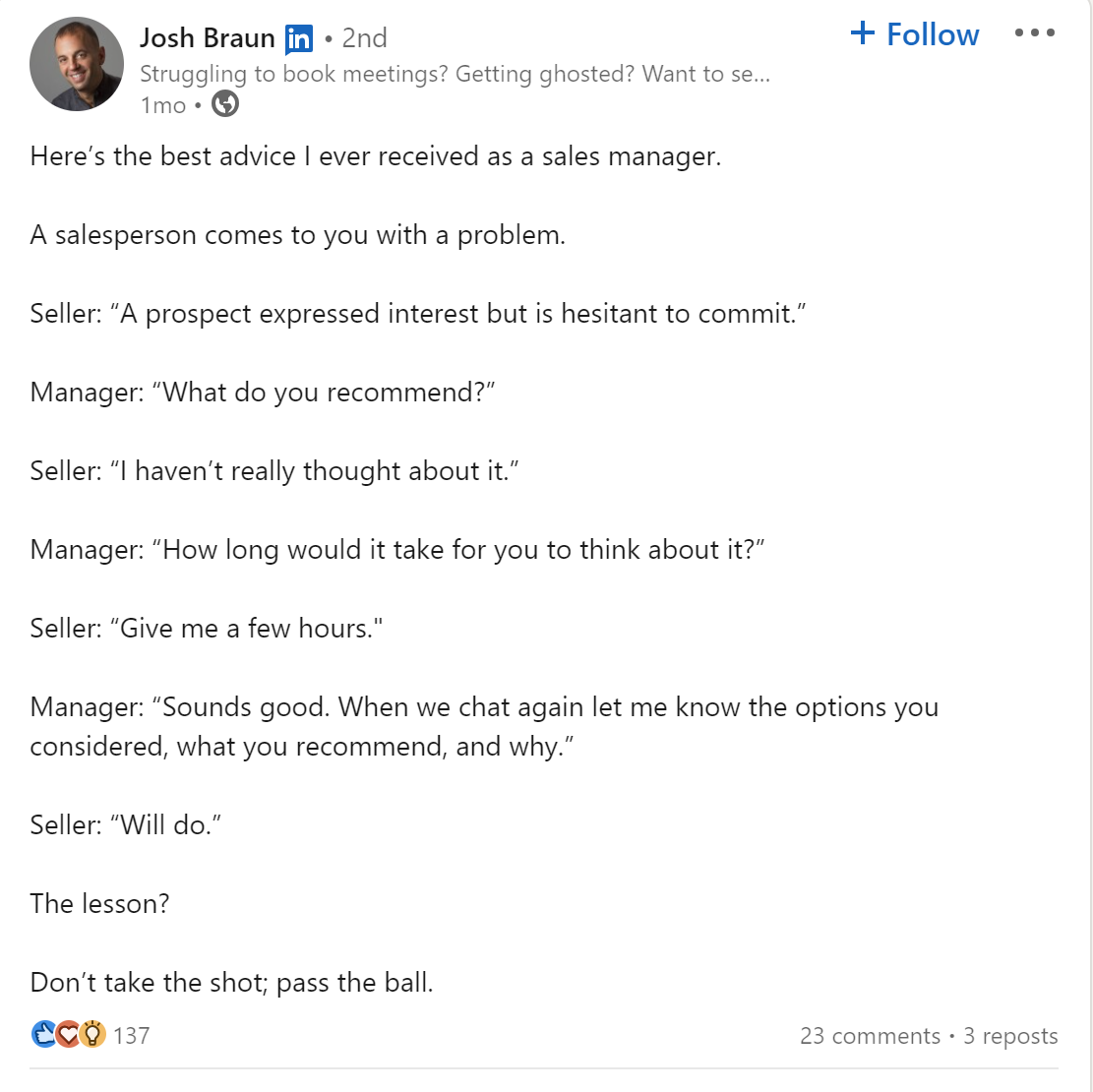
Instead of immediately solving a new sales rep's issues, encourage them to consider their options. This will get them in the right mindset for handling sales calls effectively.
The sales script can never answer every prospect's question or reaction perfectly. If it did, it would be thousands of pages long. Nobody would be able to memorize it.
Sales scripts and sales plays are just frameworks, skeletons. Sales reps must be able to flesh them out in real time on calls, or they won't be successful.
Effective communication
You must be an effective communicator to be a good sales manager. If you struggle in this area, here's some practical advice:
- Read articles and books from sales leaders you admire. This will have a trickle-down effect on how you think and communicate.
- Write down your thoughts on the company's sales processes. Getting it down on paper can help you iron out issues and improve clarity.
- Nail down a clear meeting cadence to ensure good communication across go-to-market teams — for example, using our revenue cadence builder checklist.
Sales data literacy
If you don't understand the sales performance metrics, you don't know if your actions are working. If you're a sales executive, you could take a $3,000 Kellogg Institute course on the topic—put that education benefit to use.
If you're a first-time sales manager, talk to your analysts and VP of Sales. Ask them what they think are reliable leading indicators. Get them to explain reports in your CRM or revenue platform.
Strategic thinking
Once you've identified an issue, you need to be able to create a roadmap for how to fix it. One way to hone this skill is to read case studies where sales leaders have solved performance issues. They will give you a new perspective on your own issues.
Leadership
You need to inspire the sales team to do challenging things, like cold calls. There are many different approaches to this issue, and in the next section, you can compare different leadership styles that may work for you.
Four main sales management styles
If you're an experienced manager, you should adapt your sales management style based on your team. You need to consider:
- Your sales representative's experience level
- The difficulty of the sales process (based on industry, competition, price point, and more)
- How involved you will be in the day-to-day sales process
You can then use the Hersey-Blanchard Model to choose the best option among four separate styles:
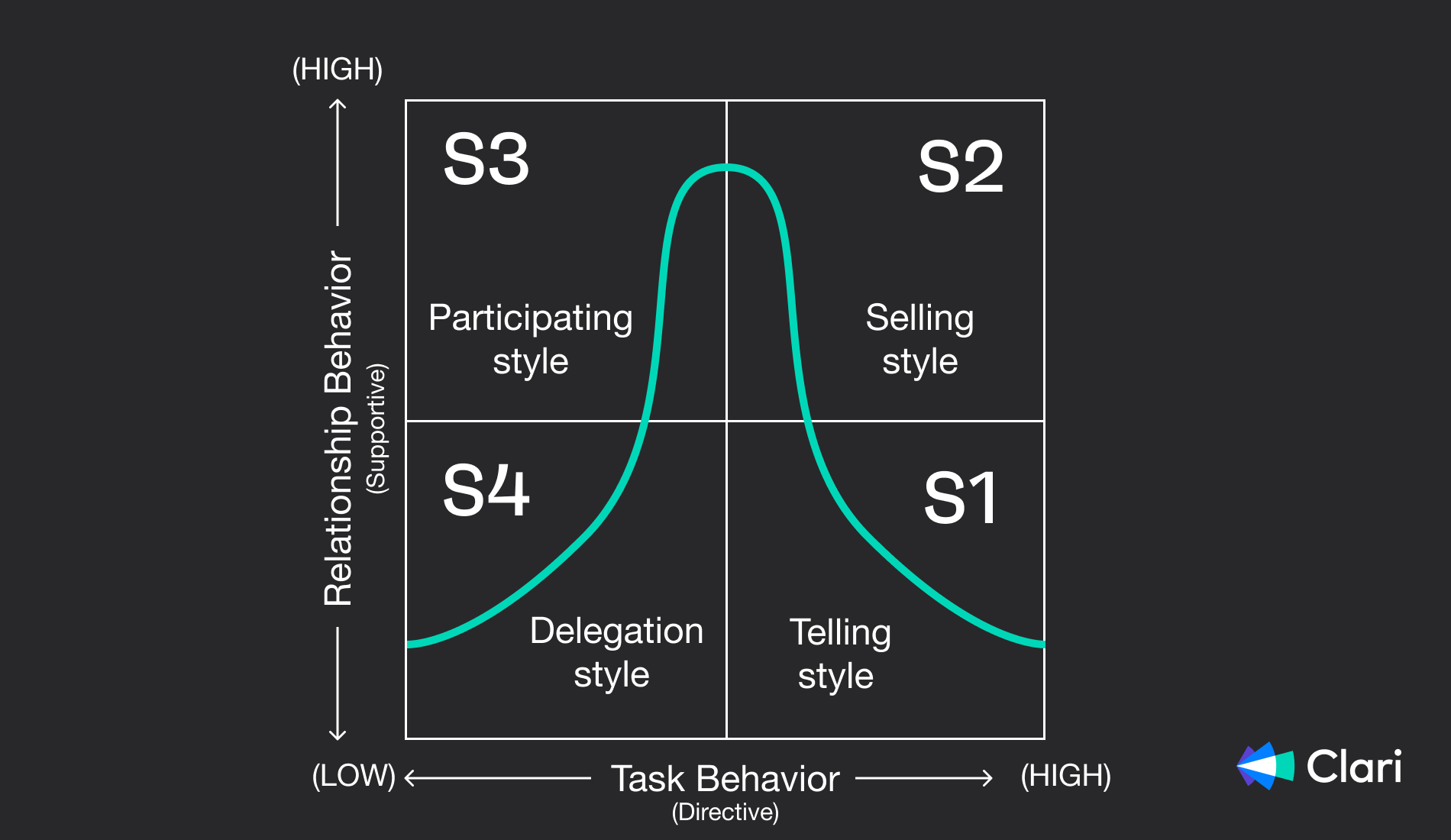
- Delegating style: When you have highly experienced sales reps, you can delegate high-level tasks, and they will manage themselves.
- Participating style: You don't completely delegate tasks but make it a collaborative process—like setting clear goals but asking for input.
- Selling style: The manager actively sells the tasks and processes proposed. They should back it up with personal experience or sales performance data. It's best suited for moderately experienced salespeople.
- Telling style: The sales manager gives specific tasks and explains exactly how to do them. This is suitable for inexperienced new hires.
A complete framework may be more helpful if you're completely new to sales management. These sales management resources can help with that:
- Coaching Salespeople Into Champions by Keith Rosen—where he covers the L.E.A.D.S framework
- Sales Management. Simplified. by Mike Weinberg
- Our revenue cadence builder helps you plan the ideal cadence of meetings — one-on-ones, sales team meetings, revenue forecast rollups, and more.
All frameworks come with their own pros and cons and need to be adapted to your situation. For best results, take the key lessons from the framework and create your own process. You need to do this in collaboration with your sales team.
Hold one-on-one meetings with reps, and ask them questions about:
- Whether they prefer independence or concrete tasks
- What performance metrics they judge their own performance by
- How they plan their day
This should give you a better sense of how to best serve their needs.
Five types of common sales management tools
According to 2021 data by Gartner, the most used sales technologies are sales engagement platforms, followed by data solutions, CRMs, LinkedIn, and sales enablement apps.
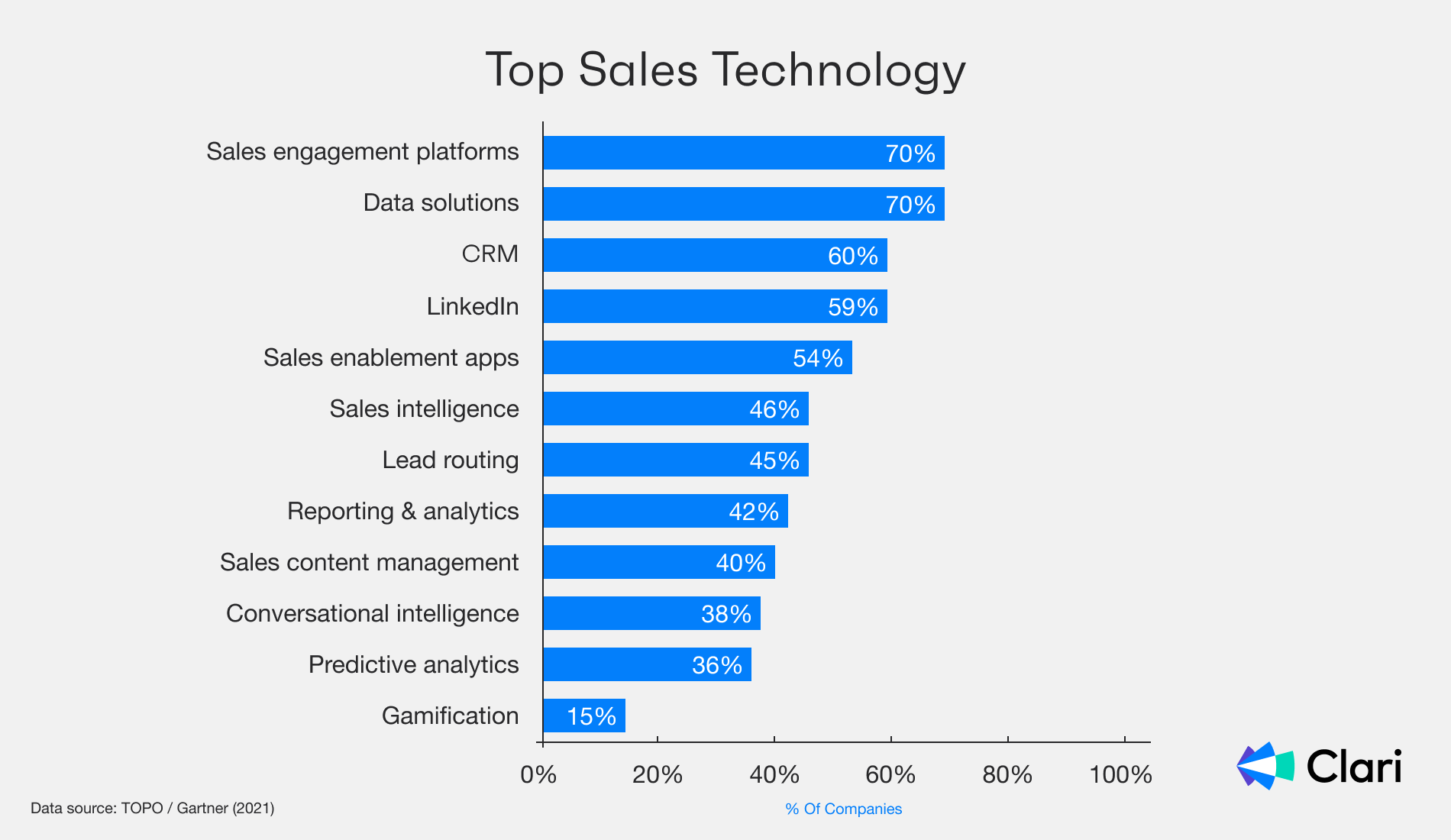
Sales engagement platforms
This type of software helps your team effectively interact with potential customers. Sales engagement platforms typically include features like:
- Prospect data highlighting in real time to improve message relevance
- Personalized follow-up by email or other channels
- Lead prioritization
- Lead relationship tracking
- Sales rep performance analytics
CRM software
Customer relationship management software helps you track customer and prospect interactions. They are one of the most reliable customer data sources for most companies. If you use a sales CRM, they often include a range of sales engagement features.
Sales enablement platforms
Unlike engagement platforms, sales enablement platforms focus on your team of reps, not your customers. They're dedicated to helping you improve the systems and processes around your reps.
Sales intelligence
Sales intelligence platforms help you gather more information on your prospects. This allows your SDRs to take a more personalized approach to outreach.
Conversational intelligence
Conversational intelligence software like Clari Copilot can help you automate part of your sales training process. It can highlight specific moments in a sales call where things went wrong and give tailored advice to each rep.
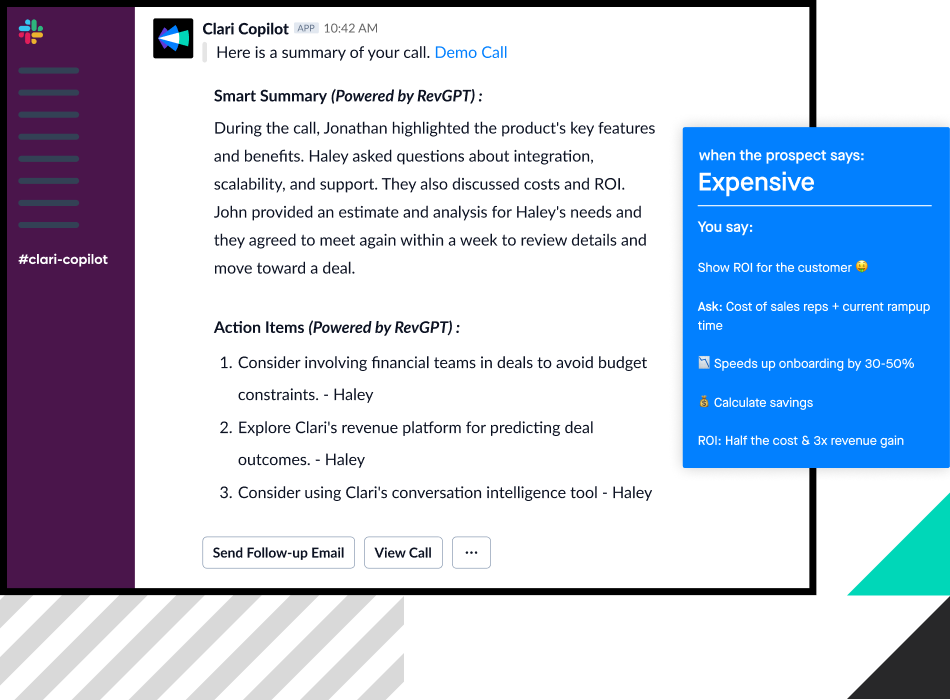
The impact of the revenue operations revolution
Sales management is no longer just about sales. With the growth in access to customer and prospect data and the power of AI to distill some meaningful insights out of that data, Revenue Operations (RevOps) is taking over.
For companies where customer lifetime value matters, it's not enough to unify sales and marketing. You need to get every go-to-market team on the same page.
That's now possible. You can get sales, support, product, and marketing leaders to work together, focusing on the same North Star metrics in a combined go-to-market team.
Sales management is no longer an isolated effort. It's something that happens as part of a larger RevOps process.
What is a sales management system, and why do you need one?
A sales management system is software—or a suite of software tools—that helps you more effectively manage your sales teams, identify key insights, and adjust your sales strategy over time.
In the age of RevOps, Clari is the perfect foundation for your sales and revenue leaders to collaborate well. Here's a quick overview of why our platform is so powerful for modern sales leaders:
Data from every sales tool is distilled into a single source of truth.
Clari collects input from a wide range of martech and sales tools to give you a cohesive image of your deals and potential revenue in the pipeline.
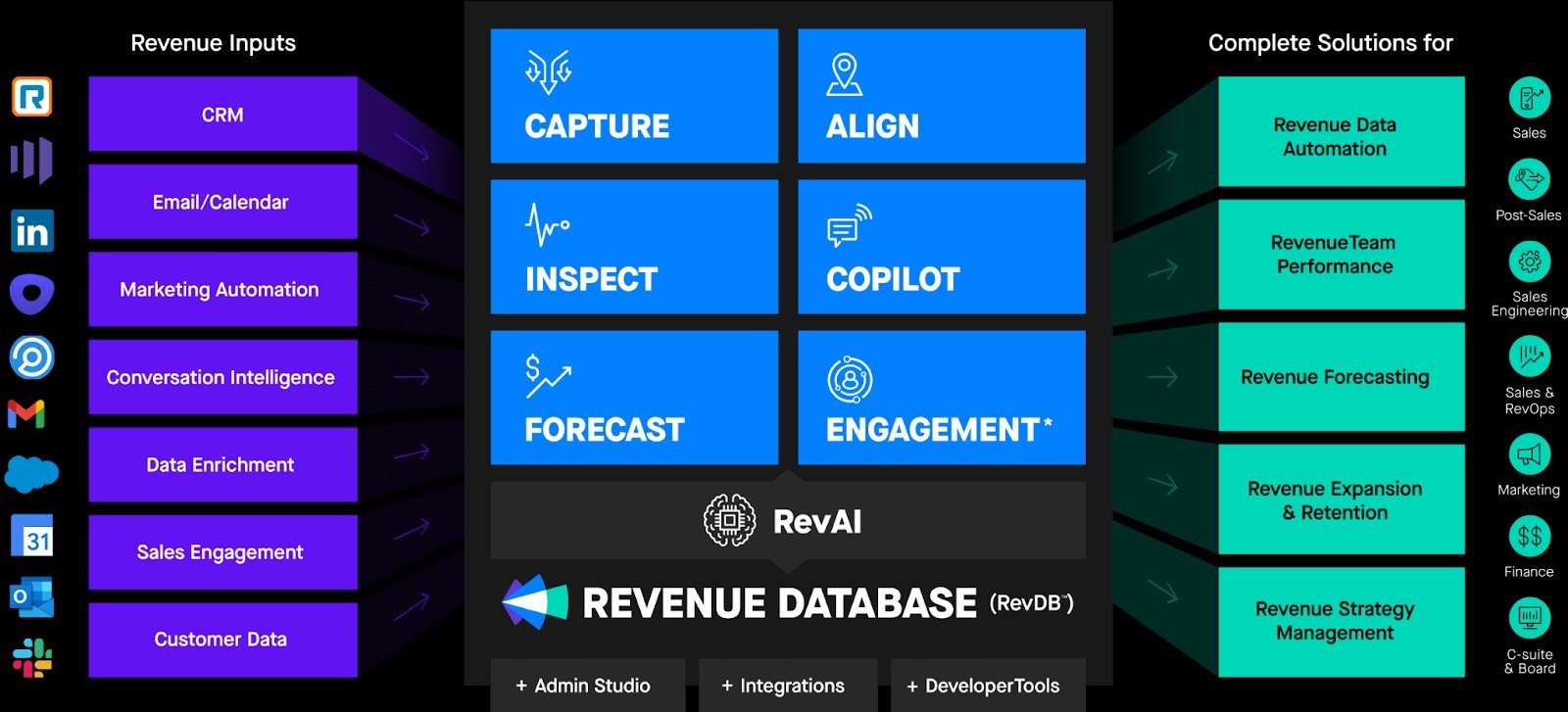
To ensure the data is usable, we reformat, clean, and enrich the data automatically. Higher-quality data means more reliable insights.
Accurate AI-powered forecasts help sales managers adjust their course.
Clari's sales forecasting tools help you adjust your course based on the likelihood of deals closing. We have everything from high-level reports across the business to forecasts based on individual sales reps.
This can help you analyze the effect of overall strategy changes and specific training methods.
Beyond forecasting, Clari also tracks actual revenue across the entire customer lifetime. That helps you see which channels, approaches, and markets lead to the most lucrative contracts.
Improve your sales strategy management with high-quality data.
Better leading and lagging indicators mean you can better manage your sales and revenue strategy.
You get insights from every stage of the sales cycle. You can see how reps respond to new training or how leads from new campaigns are converting. Revenue leaders can use these insights to improve your company's sales strategy.
Boost your sales engagement with Groove.
Through acquiring Groove, Clari now also includes a powerful suite of sales engagement tools. Groove can help you track and analyze the actual sales activities of your reps.

Which channels are they spending most of their time on? Who's performing best on calls? These are just a few questions that Groove's statistics can help you answer. These insights make it easy for sales managers to adjust their sales plays and training.
For example, if a top performer spends a lot of time on LinkedIn, figure out what they're doing right. You can then train the other reps to use LinkedIn similarly.
Groove also gives you real insights that help you prevent loss and keep prospects engaged at scale.
Understand where calls go wrong and automate sales training with Clari Copilot.
Clari Copilot is our conversational intelligence software. It uses generative AI to break down what is being said on sales calls, identify issues, and suggest ways the reps can improve.
Our AI uses a strong understanding of sales best practices to suggest appropriate tactics to handle issues your sales reps struggle with. It also draws from your sales enablement materials, like your sales playbook or sales plan, to give this personalized advice.
What's next?
If you're a business owner or sales leader looking to improve sales management in your company without making a bunch of new hires, Clari is a natural choice.
It gives your sales managers data-based insights that help them do their jobs more efficiently. From forecasts to LTV to sales performance metrics, they'll have easy access to all the reports they need.




